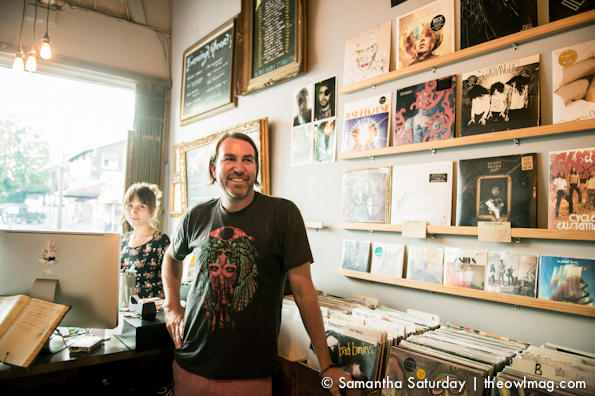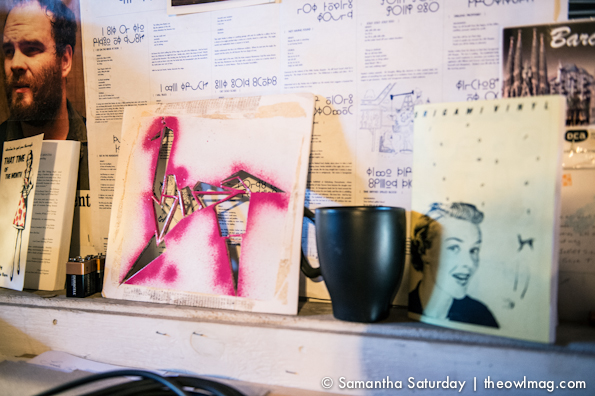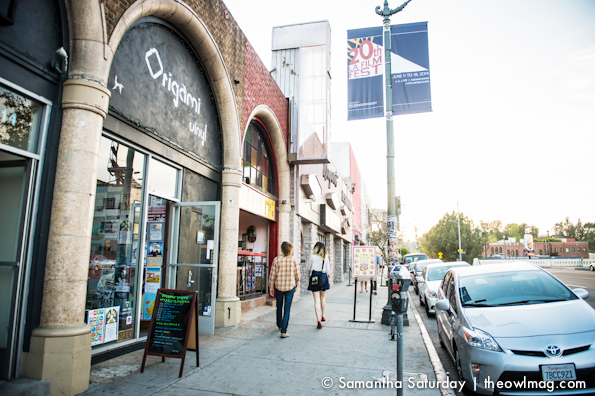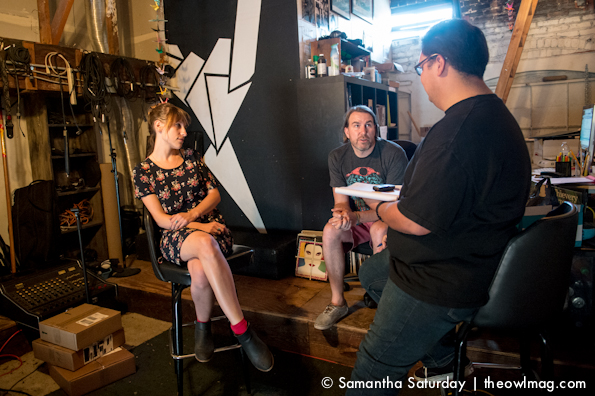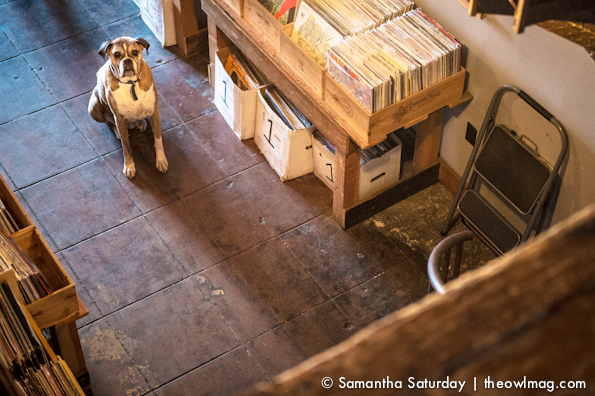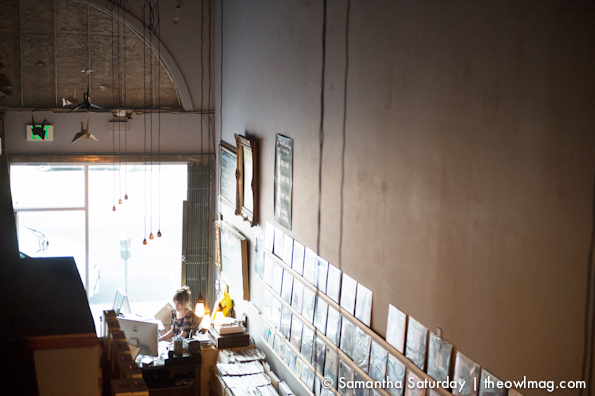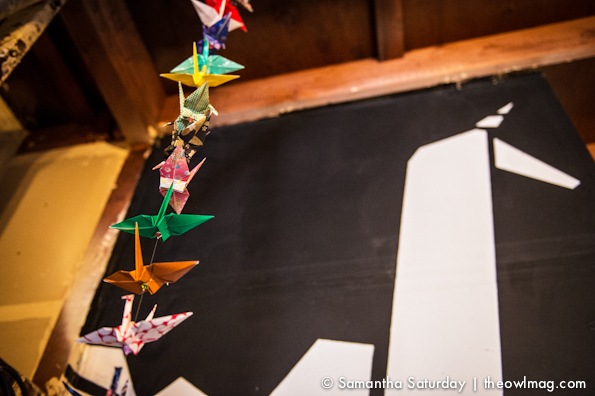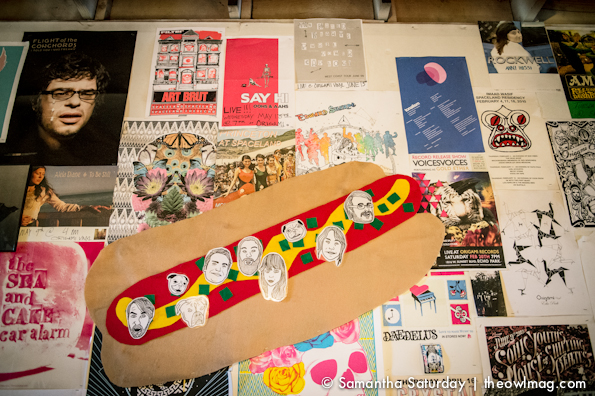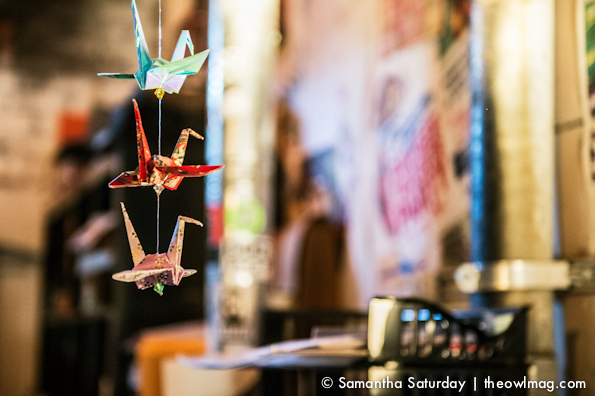EXCLUSIVE INTERVIEW: Origami Vinyl From Echo Park, CA
*Editor’s note: March 12, 2016 – We are so saddened to hear that Origami Vinyl in Echo Park has closed its doors. This was one of our favorite places on Earth. Here’s an oldie but a goodie – our sit down with Neil and Emily to discuss our mutual love of music and records. Origami, forever.
[Originally posted May 14, 2014]
Located right in the heart of Echo Park, California, Origami Vinyl is one of the coolest record stores in LA. Dealing in nothing but pure, awesome vinyl records, the shop was opened in 2009 and in just a few years has become an icon of LA, hosting a ton of in-store performances, while also presenting shows next door at the Echo and Echoplex. On a recent warm California Saturday, we sat down with Owner/Founder Neil Schield and Shop Manager Emily Twombly. The friendly duo spoke to us about the shop’s first five years, their favorite in-store performances (including a rather infamous one), their thoughts on why vinyl is coming back, and some of their favorite new records.
The Owl Mag: Record Store Day just passed. How did your Record Store Day go?
Neil: Record Store Day itself went great. It’s always our biggest day of the year, so we’re always excited and overwhelmed with the whole experience. It’s just so cool that there’s an event that evangelizes independent record stores and promoting independent music and vinyl. That’s the biggest win for it.
It was a crazy day. We had people line up at 8pm the night before. People waited 12 hours to get in the shop. By the time we opened at 8 in the morning, we had 150 people in line.
TOM: Wow.
Neil: It was pretty wild, but this is our sixth one, so we’re kind of seasoned veterans at it. We have our way of doing things pretty well down. The overwhelming thing is the lead up to Record Store Day. The day of Record Store Day, we’re all in gear and motivated, and running on adrenaline. We get through it pretty easily at this point.
But, I’m beginning to become not a super big fan of all the releases that come out on Record Store Day. I feel like it’s starting to be a bit of a capitalistic grab. This year in particular, we held a pretty hard line about what kind of records we were gonna bring in. We tried to limit the filler, and bring in the things we would normally carry on any normal release day. We carried maybe one-eighth of all the records that came out.
We barely had anything left on Sunday, so in that regard, I think we nailed it. We did half the business we did the year before, but that’s fine with me. I didn’t really wanna take the risk. Last year, we were sitting on thousands of dollars of inventory after Record Store Day because of this stuff that didn’t sell.
I’m hoping and urging the people at Record Store Day and the labels to really think hard about what they’re gonna release on those days. There’s probably a lot of leftover things in their warehouses that nobody bought. I think it’ll regulate itself over time. It’s in a weird state right now. They’ve grown it to a great place, but at this point, I wish maybe Record Store Day was one day a month, and they spread the exclusives over the year, rather than make it all about one day.
TOM: It almost feels like another Christmas, like “what can sell for this season.”
Neil: For sure. I think a lot of stores are hampered by the amount of money they have to front to buy all these records, and that actually causes a problem with record stores not being able to afford the records that come out the week before or the week after, and secondly, it really plugs distribution and manufacturing chains for people who wanna put out records around that time. All these Record Store Day releases are clogging it up, ‘cause there’s only a finite amount of places to make a record, so I have mixed feelings.
TOM: Another thing that just passed was Origami’s fifth anniversary. Five years ago, would you have imagined people lining up for 12 hours to buy records?
Neil: No. Five years ago, when I was opening the store, I wasn’t even sure if people would come. It was done out of more of a realization of a dream I had and to do something for myself rather than go work at a job. I rationalized it in my brain that if it didn’t survive for two years, the experience I would gain would still be greater than going to get a master’s degree or something like that.
TOM: When you first started, what made you choose Echo Park? Did you see that there was a scene happening?
Neil: No, the reason was because I lived here. I’ve lived in this neighborhood since 2001. I have a lot of friends around here. The space serendipitously fell in my lap through talking to people and just letting them know what I was thinking about doing. I never even looked for a space, the space was provided to me before I even knew if I was gonna do a record store or not.
TOM: In the time that you guys have been here, you’ve developed quite a relationship with Echo Park. You do Record Club across the street at El Prado, you present a lot of shows next door at the Echo and Echoplex. What is it about this town that helps it foster this community of indie rock?
Neil: It truly is a neighborhood of LA, and in that sense, you have a lot of family environment around here. You have a lot of local mom and pop shops. So you have this sense of community that maybe you don’t get in other parts of LA. People walk in this part of town, so you get that sense of people saying hi to each other in the morning. That sense of neighborhood also presents a sense of support and I think a lot of people support each other here. That comes from the Latino families, all the way to the indie rock musicians and artists. It’s weaved into the neighborhood. It’s natural and organic for all of us to be working together.
TOM: Both of you guys DJ a lot around town, and you have a lot of musicians play here. Did you have music industry connections before opening the shop or did that grow out of the shop?
Neil: No, I worked in the music industry for 12 years prior to opening the store, doing various things. I had a lot of pretty deep relationships with a lot of independent record labels and radio companies. Prior to opening the shop, I had contacted a lot of those people, like Sub Pop, Touch And Go Records, and Matador Records, since I’d been friends with them for so long. I told them about this idea and they were extremely supportive, and that’s what kind of pushed me to do it, ‘cause they felt there was a need for them have another record shop in LA. So we’ve been able to utilize those relationships through the five years.
TOM: Can you guys talk to us about Record Club, the night you host at the bar El Prado every Tuesday?
Neil: We started Record Club shortly after we opened the shop. It used to be a thing that Sean [Stentz] and I would do at each other’s houses, where we’d get together once a month, and each person would bring a record, and the person who was hosting the night would feed everyone. After we opened, the owner of El Prado came over and was like “We wanna do one night of vinyl music at the bar. Do you know anyone who might wanna do something like that?” I said “We do this thing called Record Club at each other’s houses, maybe we could do something similar at the bar,” and he was super into it.
So we orchestrated it where eight people would sign up to bring a record and we would buy them a beer, and then we would tweet about what they brought and why they brought it. It became this thing where we wanted people to be in a social atmosphere and share their passion of music, and for us, it was an opportunity to meet customers, and hang out with them in a non-business way. It was a way to get to know them on a deeper level, rather than there being money trading hands. When you’re in a bar playing music, you get to put that aside and just be fans together.
TOM: Almost like going on a company picnic, seeing your co-workers with their hair down.
Neil: Exactly.
TOM: Did Record Club lead into your new DJ night, The Times Upstairs at the Ace Hotel?
Neil: That’s completely separate. Emily and I DJ quite a bit around town, and so does Christine, who works here. We’d already had a pretty deep relationship with the Ace Hotel in Palm Springs. When they were gonna open an LA hotel, they wanted to find a way to work together with Origami. It came out of this vinyl panel I was on for Sonos with Chris Ziegler from LA Record, Gaslamp Killer, and Clifton, who does Funky Sole. At the same time I was talking to the Ace about doing a DJ thing, and it just clicked: “I should try to get seven other people who are passionate about vinyl to get together and do a DJ thing,” so it just kind of happened.
TOM: That’s pretty cool that you guys got Gaslamp Killer and Nick Waterhouse.
Neil: Those two guys were the first two guys who said yes. It’s a different thing for them. Nick, he’s out touring and playing music all the time, but that guy is one of the biggest record collectors I know, and he loves to share music, and turn people on to music, so when we talked about this idea, he was like “Oh my God, that’s something I definitely want to be a part of.” And Gaslamp Killer tours the world as a producer and as a DJ, but he’s usually playing his music on a laptop, but that dude is also a crazy record collector, like way more records than I have. He, too, was like “This is a new opportunity. I don’t have to rock the dance floor, I just get to share my music.”
So last night, both of those guys just playing the most obscure, cool records, and everyone was gettin’ down on them, it was awesome.
TOM: Is that a limited run?
Neil: It’s gonna run through summer, and then we’re gonna play it by ear from there to see if we’re still into it and they’re still into it. But after last night, everyone at the Ace just kept coming up and saying “This is the coolest night we’ve ever had up here,” so if we can keep it going and everyone maintains an interest, then yeah, I don’t see it stopping until it gets cold outside.
TOM: Spinning vinyl is an art form that seems to be going away. When you guys DJ, is it all vinyl?
Neil: Mm-hmm. I don’t think either of us know how to DJ on a laptop. *laughs*
It’s funny that you say that DJing is an art form, but you put a computer in front of me, I don’t even know how to plug that thing in and start playing it.
Emily: I don’t think I even have music on my laptop.
Neil: Wow, really?
Emily: Yeah
TOM: Do you guys have iPods?
Neil: No. I use my phone with Spotify.
Emily: Me too.
TOM: Do you guys ever play a record and have a reaction that surprises you guys?
Emily: I think it’s fun to play stuff that people haven’t heard, and it’s really cool to see people react positively, like start dancing, or just really getting into it.
Neil: I think most reactions you get are people that don’t really wanna hear your stuff. Like they’ll come up to you like “Can you play something dancier?” Or they’re coming up to you with requests. It’s like, these are my records, these are all I have, sorry. *laughs*
TOM: How many records do you guys have in your own personal collections?
Emily: *Pointing to a piece of furniture in the shop* I have about five of those squares.
Neil: I’d say you have about five or six hundred at this point. I have about 3,000.
TOM: 3,000? Wow!
Neil: Oh, that’s nothing. You should see some of these people I know who are collectors, they have tens of thousands of records.
TOM: Have those people been collecting for decades?
Neil: Some yes, some no. Our friend Jason, he’s only 30, and he’s got more records than I do, and it’s not something he’s been super hip to his whole life. Some people like to go out to dinner, some people buy jewelry, some people like to buy records. Everyone’s got their thing that they like to spend money on. Jason, he gets his paycheck, it goes to rent, food, groceries, records, and that’s it.
TOM: We remember a time when records felt like they were gonna be obsolete, but since about 2007, they’ve been steadily rising in sales. Why do you guys think that is? Why have they come back, and why have they continued their resurgence?
Neil: I’ve always been into records, I never thought it was that grim because certain records were always in the marketplace. I think the turning point was around 2003 when independent record labels like Sub Pop, and Matador, and Secretly Canadian started to package their records with MP3 download codes. I think a lot of people started taking notice in the value proposition in that. You could download the records for $10, you could buy the CD for $15, or you could buy the record for $15, and you’d get a download code. At that point, I stopped buying CDs altogether, and only bought vinyl. If I’m gonna spend money, I might as well get the download, too, so I can put it on my iPod. I think a lot of people didn’t even have record players, but saw the download code and were like “Well, I wanna own this.” I feel like that was the kick in the butt for records, was the download codes. Now people are starting to get hip to the sound quality and the artwork.
TOM: It’s like you have the best of both worlds, that cool tangible item and the portability.
Emily: I think the younger generation kind of skipped CDs. They only know MP3s and a record is their tactile, tangible thing that they can buy.
Neil: When I was in my teens, every band I loved, I wore it on my sleeve. I would scribble it on my backpack, put stickers on my car, whatever I could to let people know, this is what I listen to. When you’re a fan of something, you wanna own those things. I feel like in today’s world, if you buy the record, you’re claiming that you’re a fan of this band, and it’s like the ultimate thing that you can own that the band put out. The art is the way they intended, the music sounds the way they intended. It’s the closest you can get to seeing them live. To the kids, you don’t love that band until you own the record.
TOM: Why did you decide to go all vinyl when opening the store?
Neil: ‘Cause CDs suck. Tapes suck. It’s what I listened to, it’s what I was buying and always bought. It was a no-brainer. I think it’s the only format that you should own, so that’s why even through the whole cassette revolution, we haven’t carried cassettes. They just sound shitty. Dude, I lived through cassettes, cassettes suck. They would break, your tape machine would eat them, they sound horrible, they deteriorate. I feel like they’re just a waste, like plastic trash.
TOM: There are some people who fetishize cassettes now.
Neil: And that’s fine. If people wanna buy and listen to music, more power to them, but for me, it has no place in the shop.
TOM: One person who’s been here since the shop opened is Sean Stentz, who plays bass with a band we love, No. They’re on the road right now, what’s it like when Sean goes on tour?
Neil: When Sean and I first started here together, I always knew that that was gonna be a possibility, ‘cause that’s his passion. It was inevitable at some point. I think it’s amazing for him, he’s getting to live his dream, and the band just continues to grow and get more popular. The sky is the limit right now for those guys, so they should be out doing as much as they can. We’re super supportive of that and once we saw that the band was going to start taking off more, we started hiring more people to take on those responsibilities. So, in a way, Sean’s role has decreased here, but his personality is still a big part of what we do.
TOM: One of the things you guys are well known for are of course having live performances in store. What are some of your favorite or most memorable performances you guys have had?
Emily: For me, it was Jonathan Richman. He’s my top, top favorite person. Since I started working here, that’s who I wanted to play. It took two years, but he came in. We even had a sound guy that day, but he just came in through the back door and walked up about half way, and played acoustically on the stairs. He played five songs and then left. It was so good.
Neil: It was so punk rock.
TOM: How does that feel? To have someone you’ve wanted to get for so long actually play in your shop?
Emily: Really cool. Really great.
Neil: It was like the shop was blessed or something. For me, it was probably Jónsi from Sigur Rós. He was gonna do this in-store tour where he was gonna hit five or six record stores across the country. Obviously, when Sigur Rós plays, they’re like 30 feet away from people in the front row, so it was a huge deal to be in such intimate spaces with fans. We were the first stop on the in-store tour and he got here and freaked out. He lost his shit, he was scared, he was nervous. I don’t think he was super comfortable with the people. It was an interesting moment, ‘cause originally he was upstairs and he was gonna perform like everyone else does, up here, and the height got to him. He went downstairs and we put him on a milk crate. He stood on a milk crate above everyone and it took him four tries to get through the first song. You could tell he was so nervous, but once he finally got into that first song, he did six songs. Most beautiful thing you’ve ever heard. It’s on Vimeo, we put it up, we did a three-camera shoot with it.
He walked out, signed some autographs and left that night to a headlining show he had at the Wiltern. The next day, his management wrote a letter saying that Jónsi’s cancelling the whole in-store tour because he couldn’t deal with it. All the fans across the world went ballistic on us.
Emily: “What did you do??”
Neil: “Fuck LA, LA’s fucked up, Origami Vinyl, dah-dah-dah-dah.” I wrote a letter in response, to the management, and said “Hey, this makes us look bad. Be more open about why he cancelled it.” They went out and said it was not about Origami, or LA, or the fans, but that he was not that comfortable being in an intimate environment, and at that point, everybody was cleared over. That, and the time we had Florence And The Machine here were probably our most publicized, out-to-this-world things. Those things were great because they brought a lot of credibility to the shop.
Emily: It’s also cool to have in-stores here and then a year later, the artist is really huge, like when we had Blood Orange here. Local Natives played here after they’d started to get big.
Neil: To Local Native’s credit, they got so big so fast, it just didn’t work for their schedule. But they made a promise, and they stuck to it, and they played the loft three years later. Silversun Pickups did the same thing. So it’s really cool that bands make it a point that playing in our loft is something they have to do at some point in their career. It’s become like a badge of honor.
TOM: Are there any artists who haven’t played in store who you guys would love to have?
Neil: That’s an infinite conversation. *laughs* I guess Neil Young would be my most prized in-store. I keep putting it out there, someday maybe he’ll read something or someone will tell him and he’ll do it.
TOM: What are some artists on the rise that you guys are really digging right now?
Neil: Death And Vanilla is a band from Sweden that I just think is one of the best things I’ve heard in a long time. It goes back to Stereolab, and Broadcast, and Antenna, groups like that. It’s just really, really pretty music. They have a new album coming out this year, so I’m really looking forward to that. There’s a local artist here in Echo Park named Paul Bergmann, and the guy’s just got the deepest, darkest, kind of country folk music. It’s a little bit of Leonard Cohen, a little bit Lee Hazlewood, a little bit Johnny Cash, it’s super good, so I’m really excited about him.
There’s another band here in LA called James Supercave, and they’re starting to get their due at this point, they’re on tour with Warpaint right now. That’s a band that I just think, that could be our next Local Natives band from this area. They could easily catapult into a much bigger stratosphere.
Emily: I feel like Connan Mockasin is getting bigger and bigger, and we’ve had his records for a while, when no one really knew about them. Just in the past year he put out a new record, and it’s like really R&B, but kind of strange, but it’s cool. He’s great, and the whole band is from New Zealand. I think they could be big. Denitia and Sene, they’re like R&B, really lo-fi. It sounds like they recorded it in a bedroom or something, and it’s really good.
TOM: Where do you guys see vinyl going in the future?
Neil: I hope it continues to grow. We’re always gonna remain a small, curated, niche shop. I don’t think vinyl’s ever going to go mainstream, nor do I think it should. It’s going to become a thing that fans want, but I don’t see everyone going out and buying a record player. More and more people are gonna get into it, but I think most people will get to about 50 records, and that’s their collection. Maybe a couple of times a year they’ll buy a few new records to keep it fresh. They’re not like Emily and I, or they’re not amassing huge collections, like shopping for records every couple of weeks.
I don’t think it’s halting ever and I definitely don’t see it ever dying. I think at this point, it’s solidified itself as a viable format, and it’s outlasted all of the other formats.
TOM: What’s next in store for Origami Vinyl?
Neil: We recently launched our online shop, and that’s our big push. The store is limited by its square footage, so there’s only so much we can do here, but in the online world, that’s where we can really grow and move volume. Christine runs the online shop, and her job is solely to start to look at different opportunities with record labels and artists, and offer exclusive content around that.
For instance, we had The War on Drugs’ record, we did a pre-order with that, and got them to sign a poster that came with the pre-order, and we sold like 90 copies of that before it even came out. If we can continue to do successful campaigns like that, where artists involve themselves with our campaign, then that’s where we really wanna grow our side of the business. We wanna start looking at people from all over the world understanding what we do, and being a part of what we do.
When we ship out records, we package them like a gift. We wrap it up with butcher paper, and put our sticker on there, or we draw on the boxes, and make it very personal. It becomes this thing where, if they like their box, they’ll Instagram it. It’s got some social media around it, and it builds this community. This community that we’ve built, we’re trying to build it now in the world. It’s been very successful for us, and I think that’s really the future of this shop. This is the home base, but what can we do online?
Huge thanks to Neil and Emily for taking the time to chat with us.
Check out Origami online: OrigamiOrigami.com / twitter.com/origamivinyl / instagram.com/origamivinyl / facebook.com/origamivinyl
